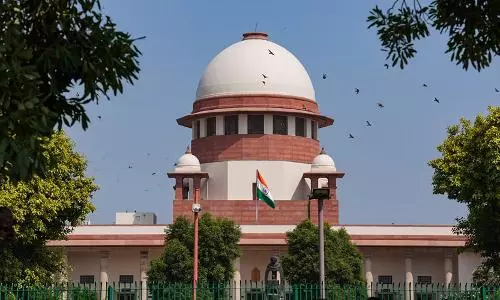
Need sound policy - and law - to check bad influence of social media
text_fieldsThe Australian Parliament's decision to pass a law banning social media use by children under 16 has sparked global discussions. As the first country in the world to enact such a law, it has ignited debates on its fairness and necessity at various levels, likely due to the recognition of its importance. Australian Prime Minister Anthony Albanese has stated that setting an age limit for social media interaction aims to help children better understand and engage with real life.
The law, scheduled to be effective with the start of the new year, requires social media companies to ensure that children under 16 cannot open accounts or access content on their platforms. This regulation applies to firms ranging from Meta, which operates Instagram and Facebook, to TikTok, which is highly popular among the youth in Australia. Platforms like Reddit, X (formerly Twitter), and Snapchat also fall under its purview. Companies that fail to comply with the law will face hefty fines.
While parents and guardians have generally welcomed the ban, platform firms have opposed it. TikTok has argued that banning social media could divert children toward other, more dangerous corners of the internet. However, the Australian Prime Minister has emphasized that ensuring children’s online safety is the responsibility of these companies.
There is no doubt that the objective of Australian law is commendable. Adolescence is a crucial stage in children's development. During this stage, the influence of social media interventions is significant not only on their mental and intellectual growth but also on their physical health. Studies indicate that screen addiction can impair attention and concentration. It has also been found that the negative impact of social media on children is greater than on adults.
However, the details and practicality of the law passed by Australia are being questioned. Being a hastily created law, it is blames for being lacking in sufficient forethought. Platforms such as YouTube, Messenger Kids, WhatsApp, Kids Helpline, and Google Classroom have been exempted from regulation, considering their educational and health-related content. However, some of these platforms can expose children to exploitation, manipulation, and negative influences. There are no solutions provided in the law for this issue.
Many children who receive significant mental support through social media are present in shelters and other places. It has been noted that a social media ban could weaken their connections with both families and psychological counsellors. This factor was not taken into account when the law was created. Additionally, the fear that children might fall into the grip of the darker corners of the internet, where even limited oversight and security do not exist, remains unaddressed. In short, a law with good intentions could end up being either an impractical dream or an immature move that defeats its own purpose. This is an issue that other countries contemplating this approach should also consider.
The negative impact of social media in India is an undeniable reality. Recently, the Prime Minister has also been thinking out loud about cyber frauds. However, the issues social media creates for children are not being taken into account. In reality, these issues deserve special attention. India is ahead in implementing regulations on internet systems, including social media. However, the country lacks a well-thought-out and comprehensive policy on this crucial issue. The restrictions in our country mainly address government concerns related to national security and public order. Societal concerns regarding the younger generation as well as about the spread of hate messages have not been major issues for the government or the parliament. The ban on TikTok, for example, was not about safety or social security; it was merely prompted by political hostility toward China. Since most social media platforms are owned by American companies, it has been noticed that the U.S. government intervenes in such cases. At the same time, in the U.S., (like in France), there are partial regulations on social media for child safety. India must take steps to evaluate the influence, advantages, and drawbacks of social media from a broader societal viewpoint. Policies and laws that balance security, freedom, privacy, and commercial interests should be considered. Creating a parliamentary study committee for this purpose would be a positive step in this direction.
























